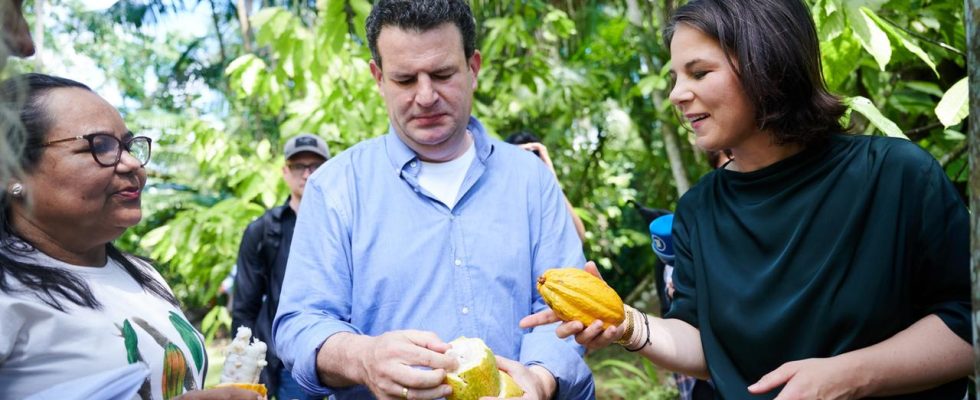report
How can the people of the Amazon use the rainforest economically without destroying it? During their trip to Brazil, Foreign Minister Baerbock and Labor Minister Heil visited a cocoa cooperative.
“At eye level” is a term that is often used when Annalena Baerbock and Hubertus Heil visit Latin America. The Federal Foreign Minister and the Federal Labor Minister are courting Brazil as a trading partner. Climate protection and trade should not be mutually exclusive, but complement each other perfectly.
Heil starts twice vigorously until the hard shell of the cocoa fruit is cracked. He hits her hard against the tree, which Baerbock is not quite comfortable with. “Please don’t hit me!” she calls out – at least with a smile on her face. The foreign minister knows very well that the SPD labor minister has no intention of hitting his cabinet colleague from the Greens with a cocoa pod. On the contrary: you make the perfect team on this trip to Brazil – far removed from internal coalition disputes.
Sustainable protection of the rainforest
Baerbock and Heil are on a joint mission: they visit a cooperative on the foothills of the Amazon, on the island of Combú, which belongs to the city of Belém in northern Brazil. At 35 degrees and a humidity of 80 percent, it goes over the muddy rainforest floor to the women who have teamed up here. They market the products of the forest: cocoa beans, acai berries and other fruits.
Heil wants to know from the women whether they sell the products themselves here in Belém or through a dealer. They sit opposite each other on plastic chairs in the middle of the jungle. The chairs sink into the wet earth. The fertile ground is home to women like Izette. She takes care of her products herself, she explains. The men had nothing to do with the business. Then Minister Baerbock pricked up her ears.
exhibit feminist politics
The Foreign Minister praised the independence of the women, their personal responsibility and their business acumen. For Baerbock, women like Izette are the best example of feminist foreign and development policy. Such terms are new in the Brazilian jungle. Baerbock tries to explain what the German government means by that: “We have decided to see where the money we provide goes. We call that gender-sensitive.”
When the interpreter translates this, the women have to laugh. They’ve always done it this way here: they manage their forest, only growing as much as they need and can sell. If things go well, they earn 300 euros a year.
federal government wants to top up Amazon funds
Germany had suspended its support for the Amazon Fund under Jair Bolsonaro’s government. Anyone who simply wants to cut down the rainforest should not receive any money from Germany. After changing to President Lula at the helm, the federal government reopened the fund. 55 million euros have already flowed out of Germany. Now another 35 million are added.
Germany is the second largest international donor. There is also a good deal of self-interest behind it. Baerbock explains the commitment with security interests. If supply chains with South America don’t work, others would fill that gap, she says. But the Chinese didn’t care about social and climate standards. According to Baerbock, the consequences would be foreseeable: “We will then have no access to these markets.”
World Climate Conference 2025 in the rainforest?
Brazil has applied to host the 2025 World Climate Conference in Belém. In the rainforest, where Izette grows cocoa. The women ask her to try Baerbock. Dozens of raw cocoa beans lie in the open fruit, encased in light, whitish flesh. The foreign minister pulls one out and tastes the meat. You can’t eat the bean yet. Her verdict: “It really tastes great – like a fruit candy.”

